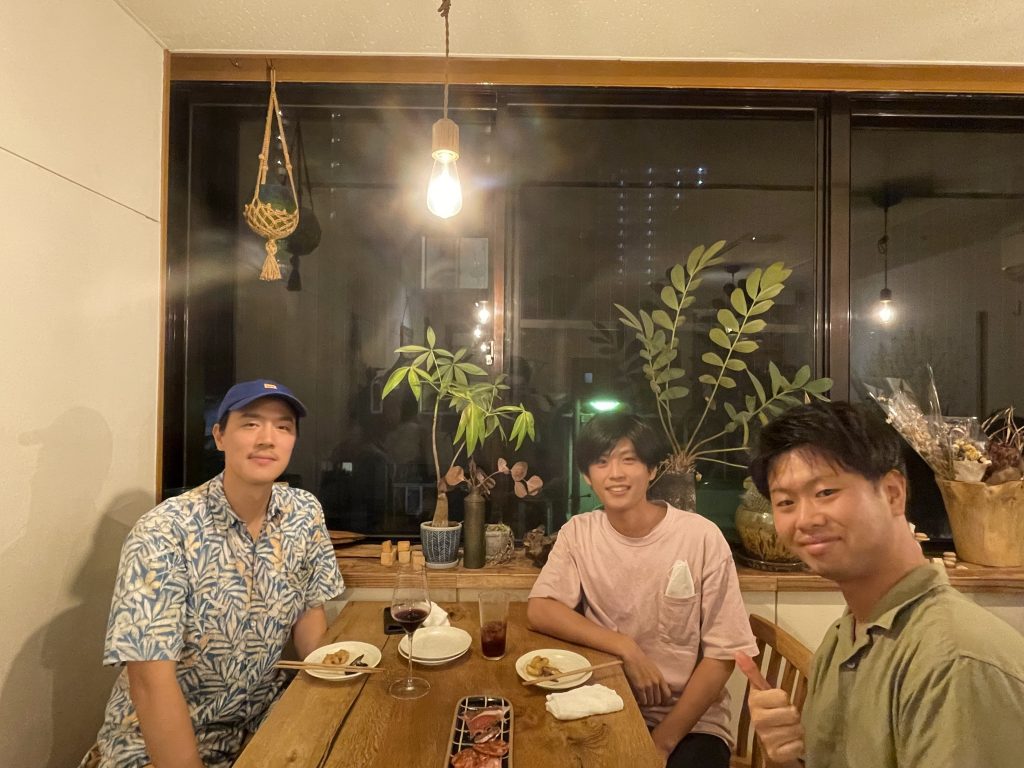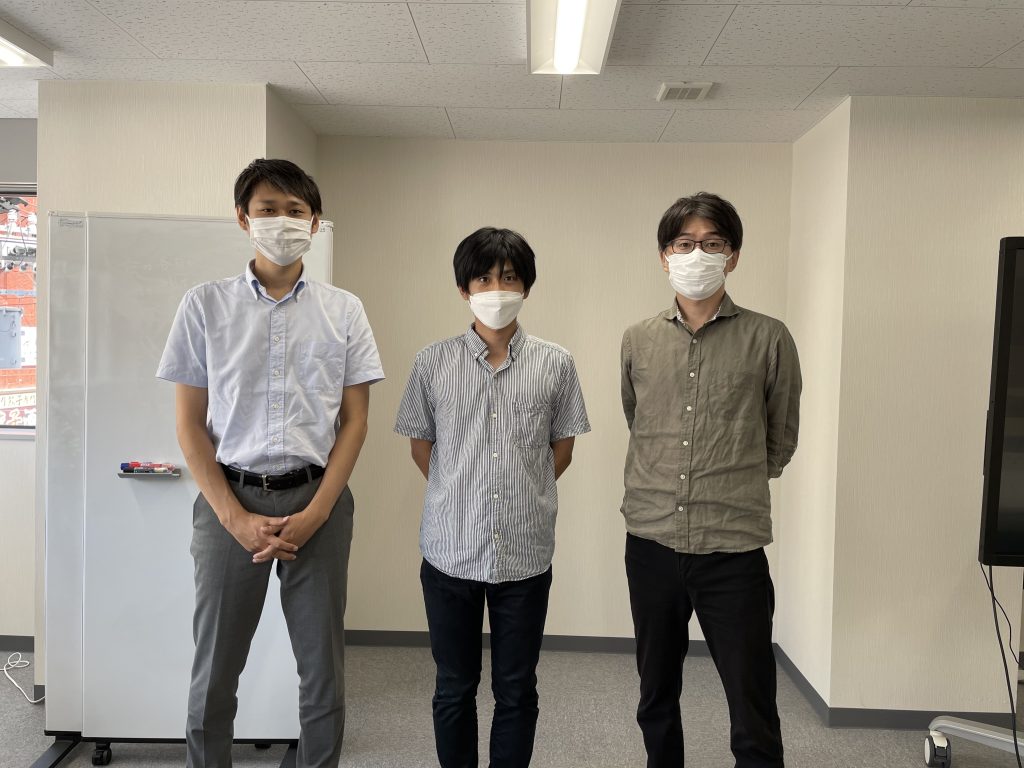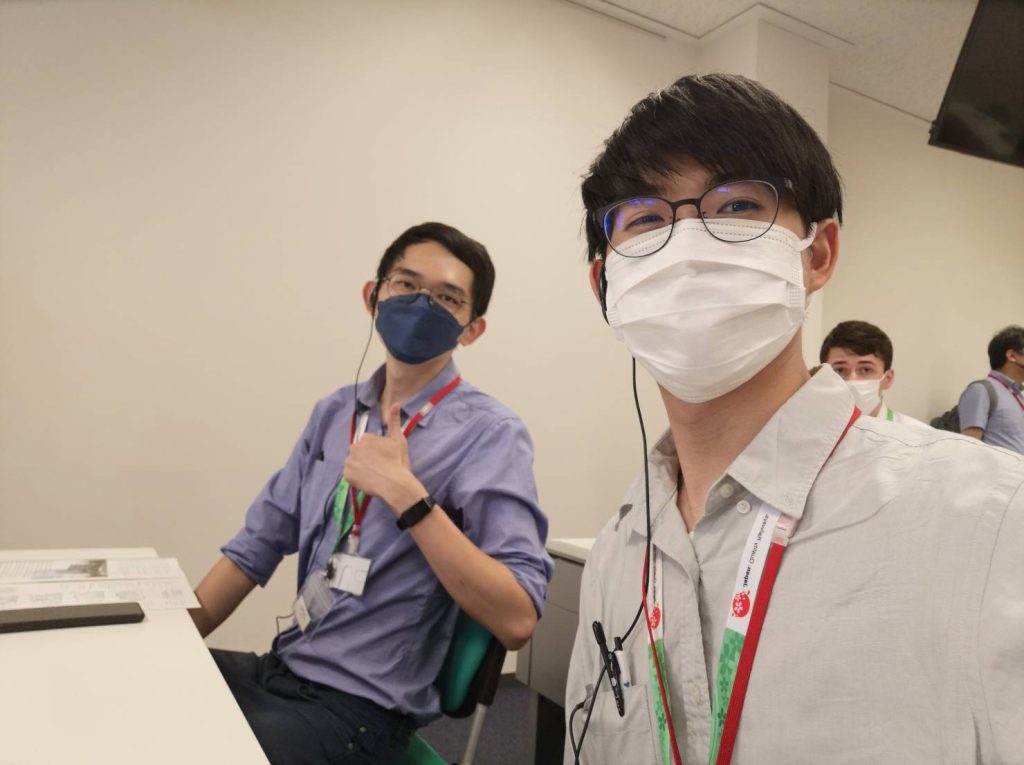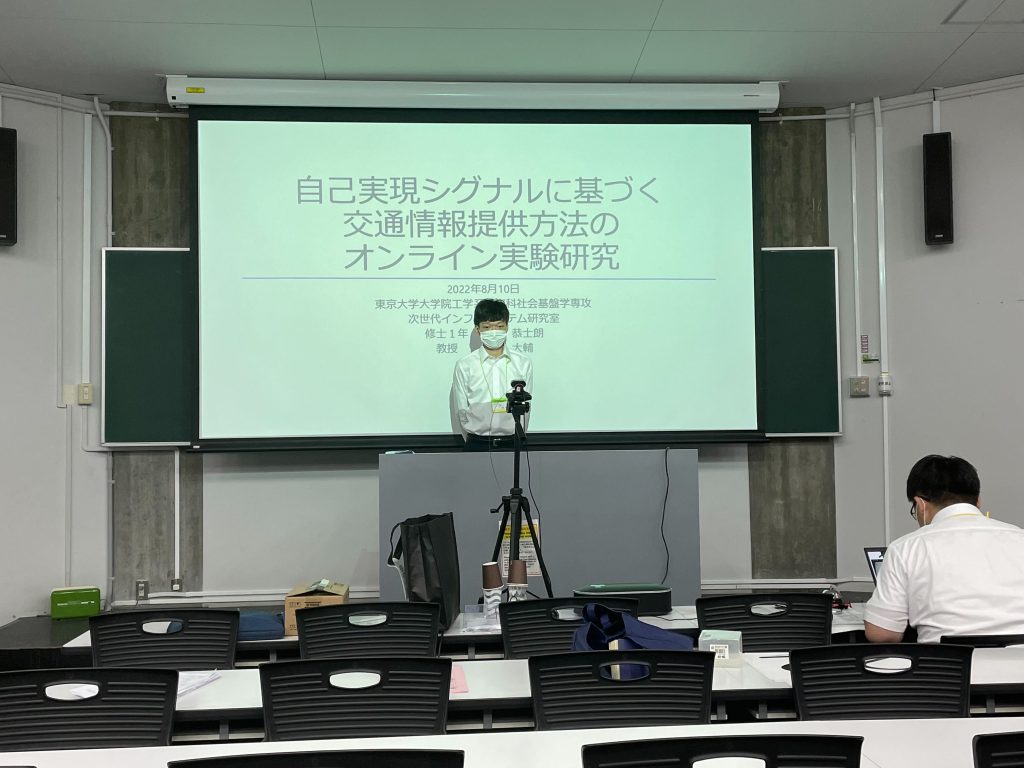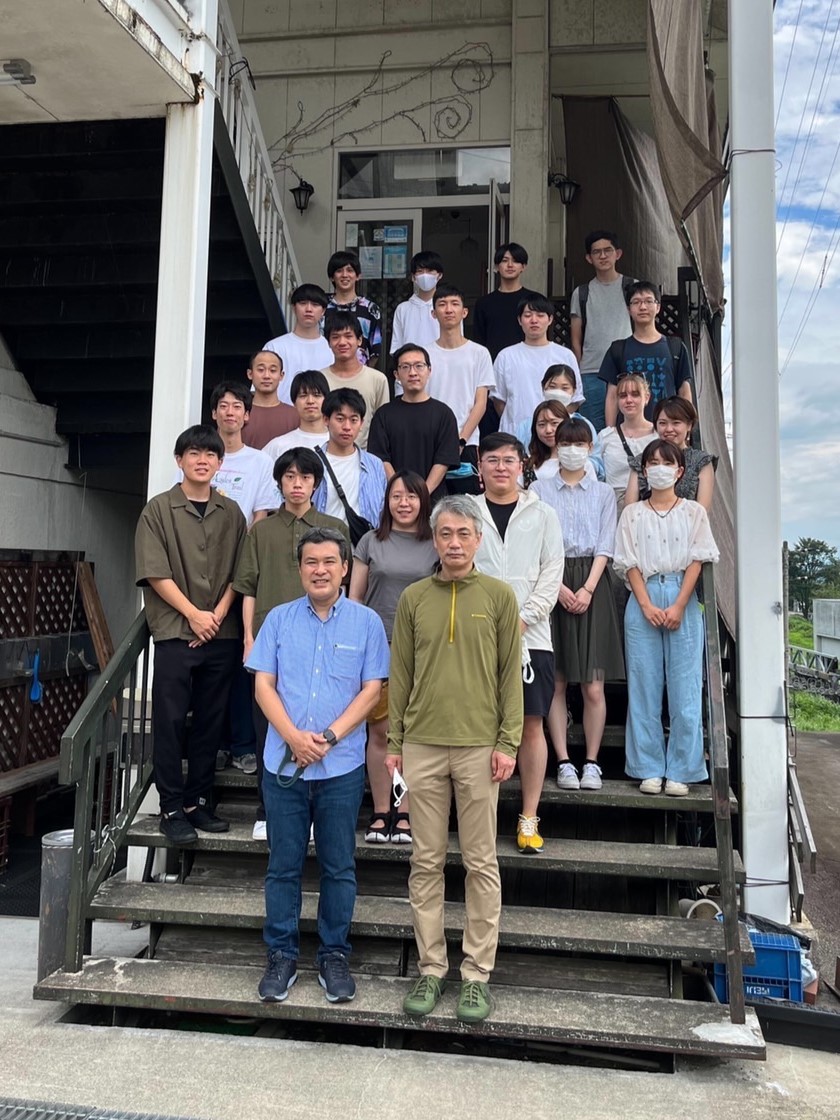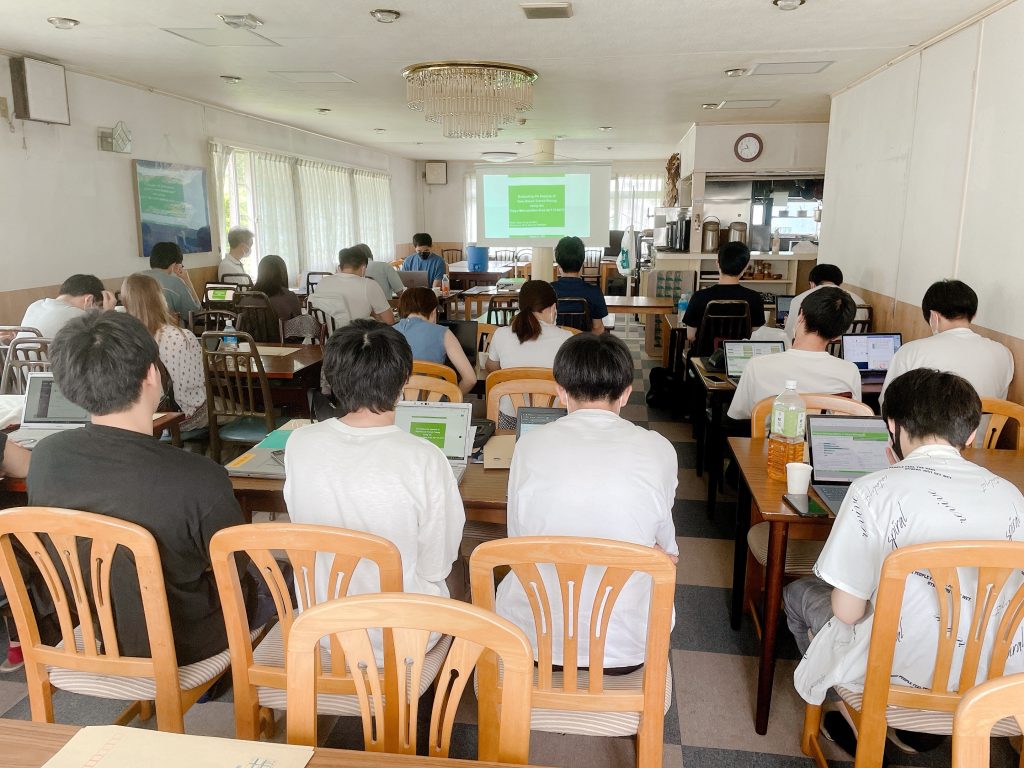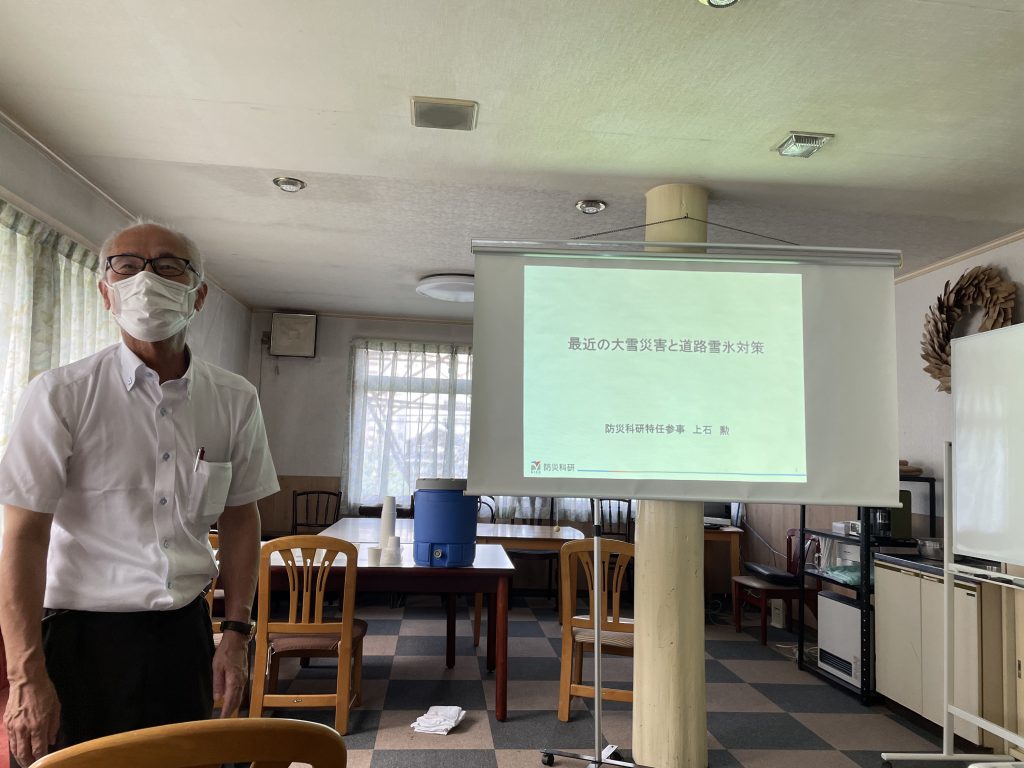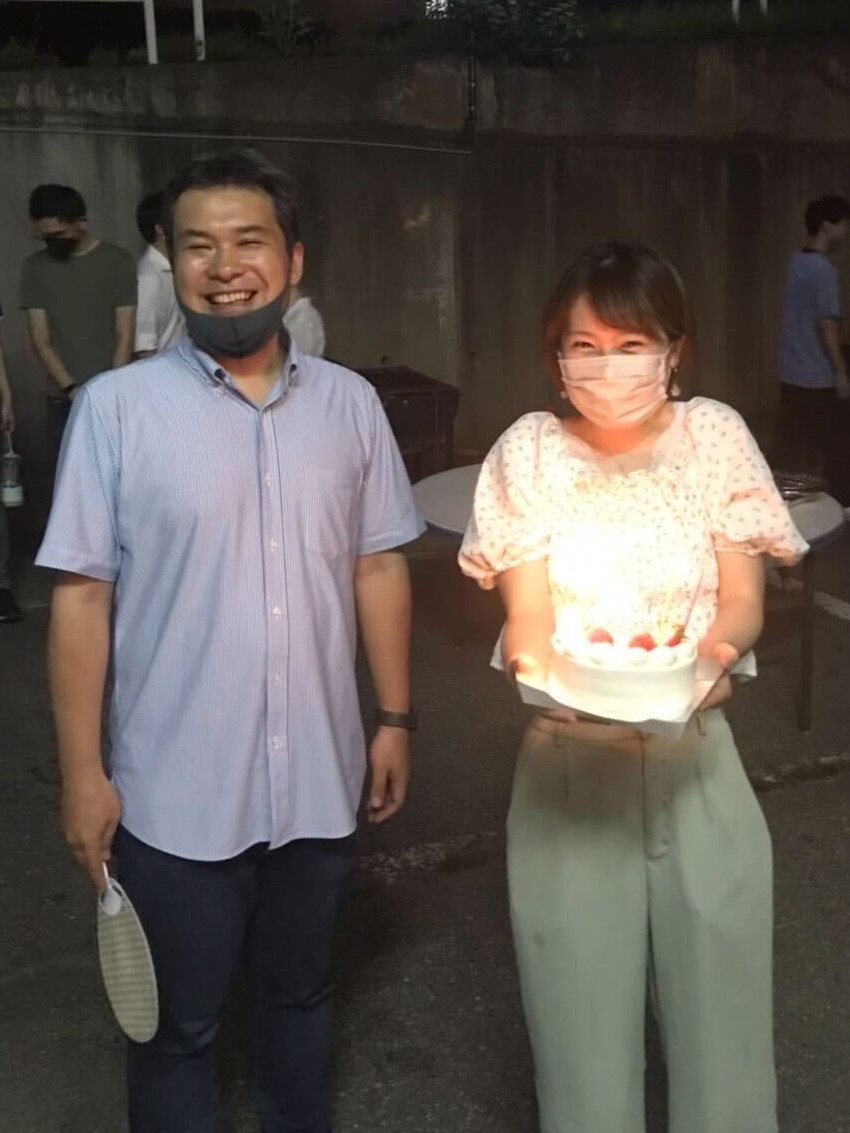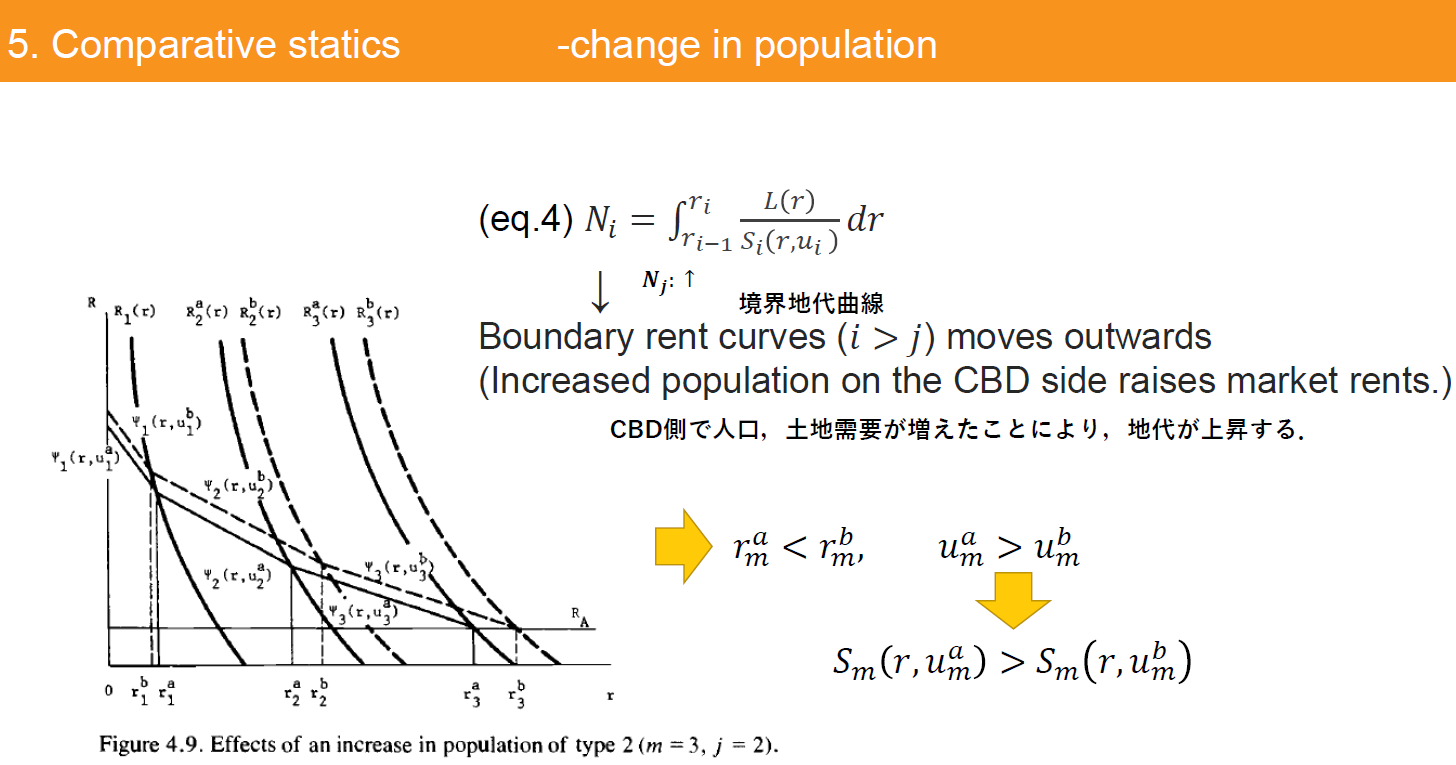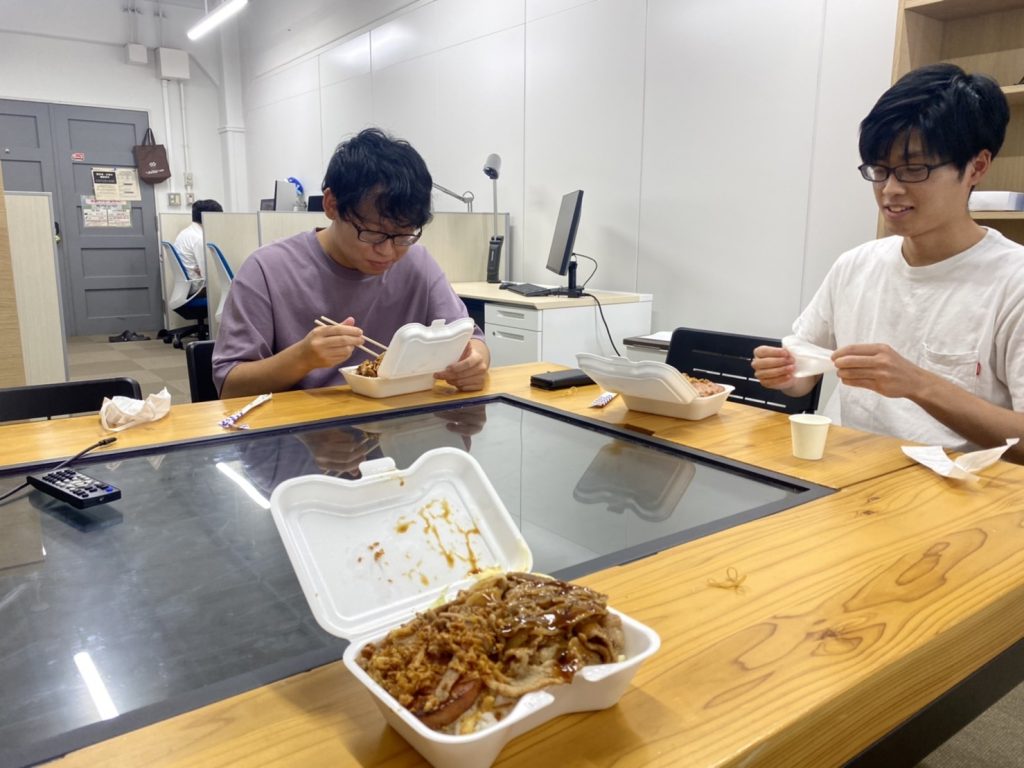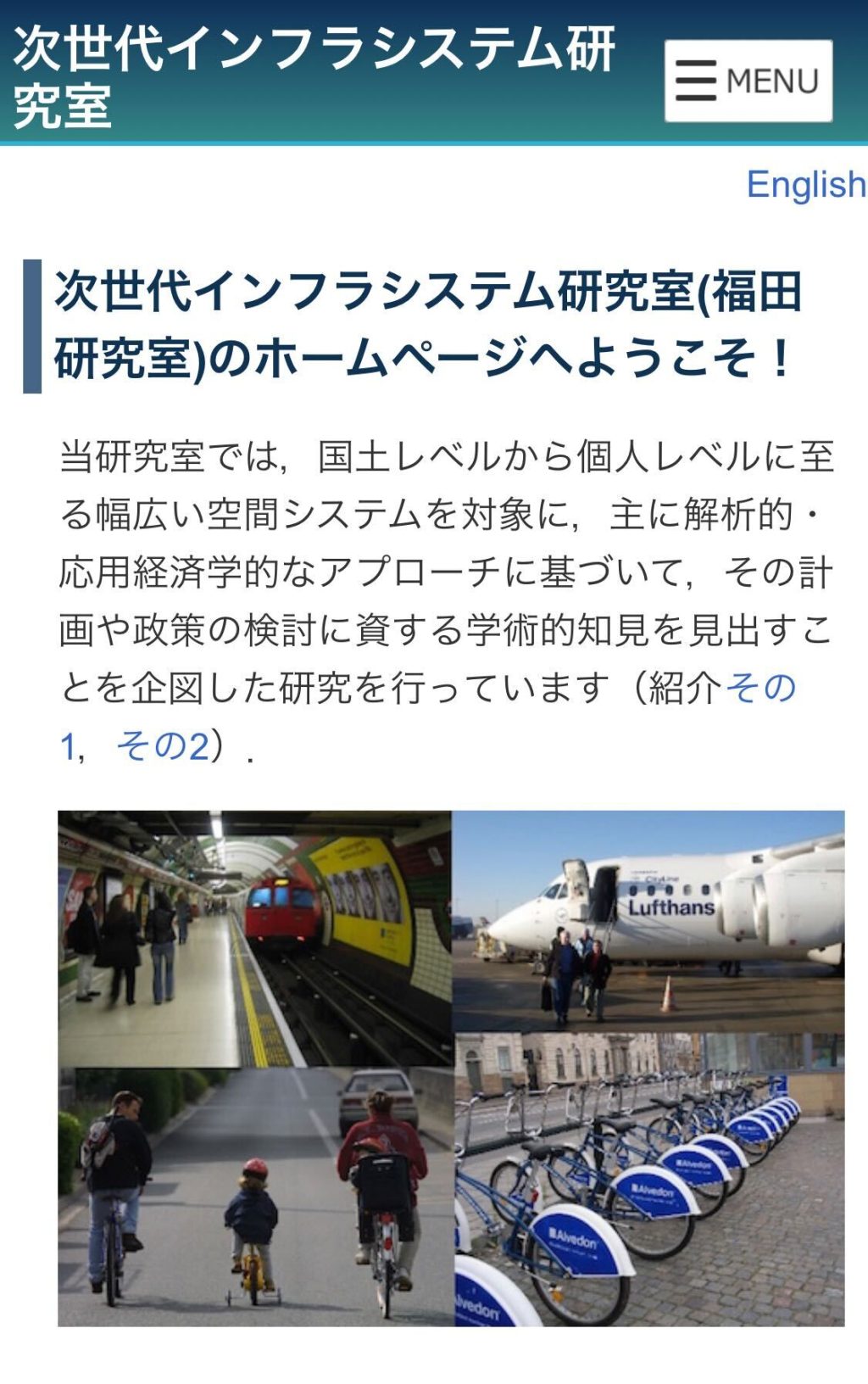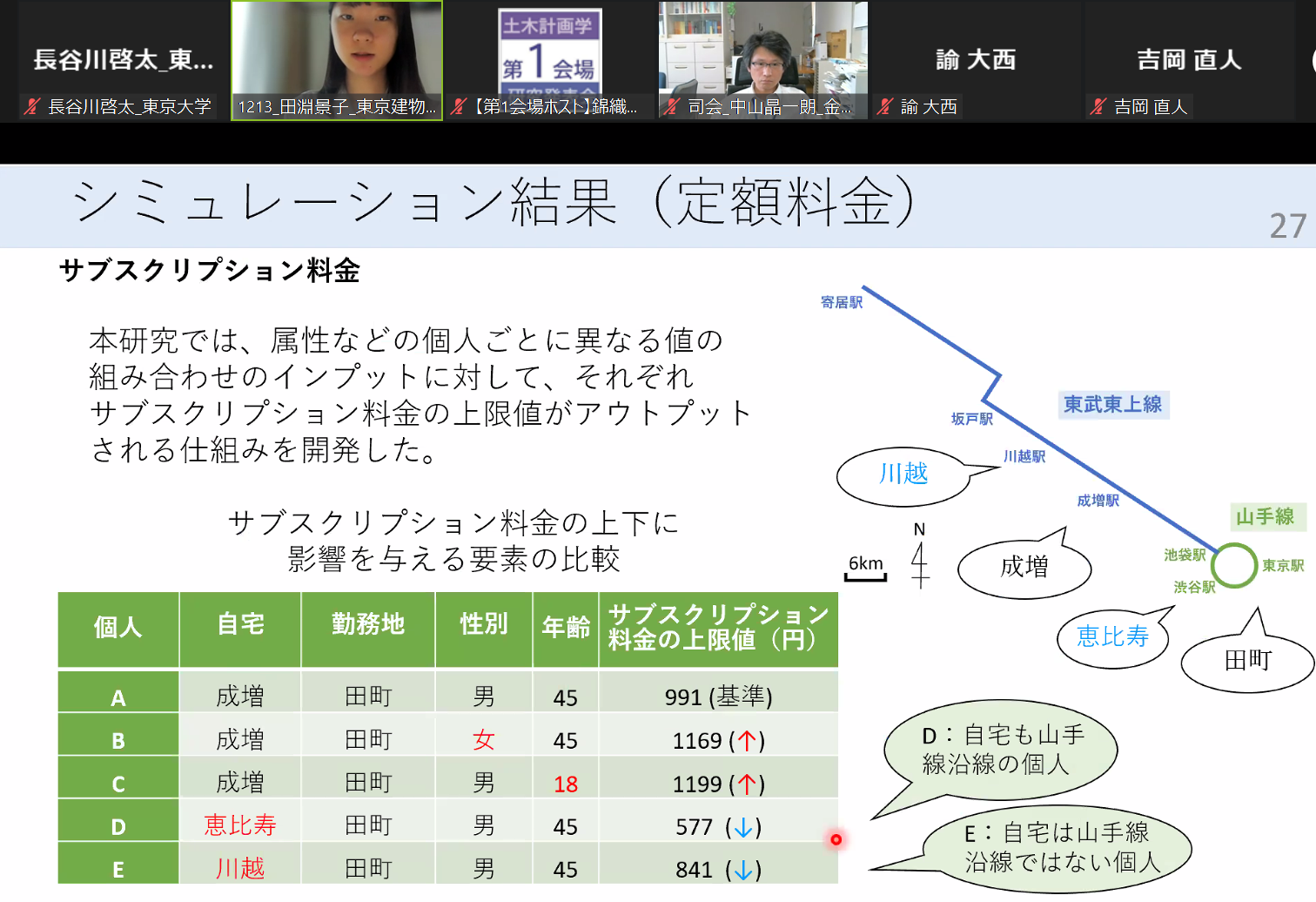Report on the visit to Kanazawa University
Last week, Mr. Hasegawa (M1) visited the Urban System Science Laboratory of the Department of Geoscience and Civil Engineering in the College of Science and Engineering, Kanazawa University.
Prof. Takayama has accumulated a lot of research on quantitative spatial economics, which I dealt with in my graduation thesis. He asked me questions and gave me some suggestions on my research presentation at the spring conference of the Committee of Infrastructure Planning and Management. Moreover, Dr. Dantsuji, who graduated from our lab, is affiliated with this laboratory as an assistant professor currently. It was through such a connection that I was able to make this visit!
As for the contents of my activities, I learned about the latest research trends about quantitative spatial economics throughout the week. In particular, I had some direct discussions with Professor Takayama. He gave me some advices on what kind of research I should conduct for my master’s degree based on my interests. I believe that this experience will greatly contribute to my future research activities.
In addition, I presented my research to Mr. Sugimoto, Dr. Takayama, and Dr. Dantuji from Yachiyo Engineering Technology Development Institute, and they gave me some advices on my research. I have known Ms. Sugimoto and Dr. Takayama in some papers and online conference presentations, and it was a very valuable time for me to gain some advices from them.
I also had participated in their laboratory meeting. It was a good opportunity for me to know research topics of their lab students and to know other laboratory’s characteristics. Furthermore, I was able to communicate with their lab students during some research sessions and meal times. Thanks to that, I was able to spend a fulfilling week, and to devote myself to my research.
Lastly, I would like to take this opportunity to thank Professor Takayama and everyone at the Urban System Science Laboratory. Thank you very much for the week!
[Hasegawa (Translated: Chee Yung)]
Speical Summer Seminar @GRIPS
On 4th and 5th September, Mr. Krittanai and Mr. Chee Yung (M1 students) participated in a special summer seminar, “Railway Systems and Urban Development of Mega Cities”, which held at the National Graduate Institute for Policy Studies (GRIPS). It provided international students with a platform to know the full picture of urban transportation in Tokyo and to communicate with each Japanese organization or company directly.
The first day of the summer seminar was the lecture session, which consisted of two parts, “Overview of railway systems and urban development in Tokyo” and “Changes induced by the pandemic and future strategies”. The former provided us with the overview of the mobility development in the Tokyo Metropolitan Area from past to future, especially in the development of the railway network. Prof. Fukuda had given the speech, “The future of mobility in Tokyo after the pandemic”, in the first part of the lecture session. He had clarified some possible changes in daily travel behavior due to the COVID-19 pandemic.
While for the latter part, several speeches had been provided by Japan Transport and Tourism Research Institute (JTTRI), Mitsui Futosan, JR-East, Tokyo Railways and Tokyo Metro. As the pandemic has changed our working styles and travel patterns thoroughly, each organization and company have started to change their business and management strategies against the pandemic.
On the second day of the seminar, participants were divided into two groups for site visiting. We were assigned to the first group where our destinations were Nihombashi, one of the most important commercial areas in Tokyo, and Tokyo Metro General Training Center.
At Nihombashi, the presenter from Mitsui Fudosan presented their plan to revitalize Nihombashi. It was very interesting that they are trying to preserve heritage buildings while pushing the area toward contemporary lifestyle. After the presentation, the presenter showed us around the area and the places they are developing. We got to see Nihombashi bridge which is a landmark of the area and an interesting place in terms of transportation and urban landscape because they are planning to remove the highway above it and construct a tunnel instead to improve the appearance of the area.
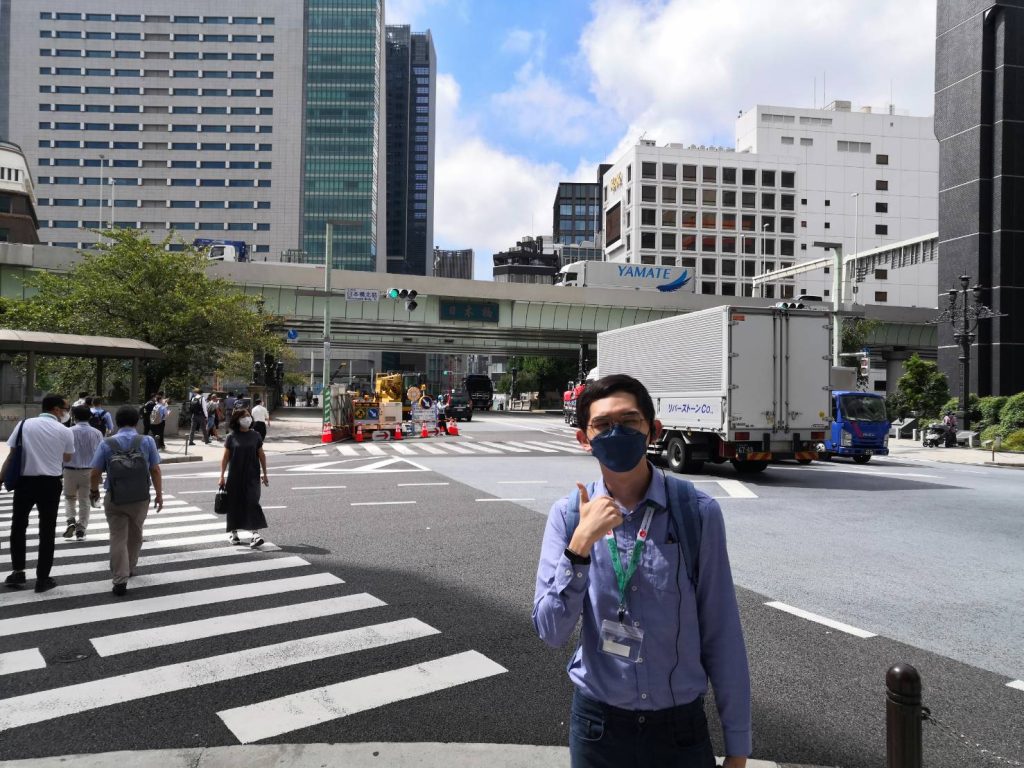 After that, we went to Tokyo Metro General Training Center where we learned how they are training their clerks. The presenter from Tokyo Metro walked us around the building and showed us almost all of the trainings and systems, from how the ticket machines work to how to operate a train. All participants were impressed by how advanced their technology for training is. Some of us even got the chance to try operating a train using virtual simulation technology.
After that, we went to Tokyo Metro General Training Center where we learned how they are training their clerks. The presenter from Tokyo Metro walked us around the building and showed us almost all of the trainings and systems, from how the ticket machines work to how to operate a train. All participants were impressed by how advanced their technology for training is. Some of us even got the chance to try operating a train using virtual simulation technology.
[Chee Yung, Krittanai]
Research Presentations at Japan Society of Traffic Engineers (JSTE)
[9-10 August 2022]
On 9 and 10 August, Mr. Ebashi (M1) and Mr. Sakurai (OB) presented their research at Japan Society of Traffic Engineers (JSTE), which was held at the Waseda Campus, Waseda University. Their research titles are shown as follows:
Analysis of the impact of introducing congestion charging to tourist attractions on excursion tourism behavior. [観光地への混雑課金導入が周遊行動に与える影響への分析]
(Rikuto Sakurai, Natsuho Iokura, & Daisuke Fukuda)
Online experimental study of a traffic information provision method based on self-fulfilling signals. [自己実現シグナルに基づく交通情報提供方法のオンライン実験研究]
(Kyoshiro Ebashi & Daisuke Fukuda)
We have received many useful comments on each presentation from Prof. Muromachi of Tokyo Institute of Technology and others. Here, we would like to take this opportunity to express our gratitude towards them.
[Ebashi]
| Conferences Lab Life by Students
Joint Seminar Camp @ Echigo-Yuzawa
On 1st and 2nd August, we held a joint seminar with Sasaki Kuniaki laboratory of Waseda University in Echigo-Yuzawa, Niigata Prefecture.
During the joint seminar, research presentations were made by mainly M2 and M1 students from both laboratories. From our lab, (M2 students) Mr.Arai, Mr.Tabata, Ms.Hazama, and (M1 students) Mr. Krittanai and Mr. Chee Yung have presented their research. As the students were working on similar research themes, for instance, the utilization of big data, traffic networks during disasters, and land use regulations, there was a lively discussion after each presentation.
Moreover, Mr. Kamaiishi from the Snow and Ice Research Center of the National Research Institute for Earth Science and Disaster Resilience, has given a keynote lecture on snow damage. For those of us who live in Tokyo, snow damage rarely attracts attention from people. However, the snow damage in the snow-rich regions is a very serious problem, especially in terms of the economy. I have realized that the snow damage is a disaster that requires more necessary countermeasures just like other disasters. The whole joint seminar has provided me with good inspiration for my future research activities.
On the night of the first day, we presented a birthday cake to Ms. Nakamura (B4) who had a birthday the day before the joint seminar! The members of the Sasaki Lab also celebrated it with us, making it a grand birthday party!
End of the 10th-14th lab seminar & first semester lab activities!
Yesterday’s lab seminar marked the end of our lab’s activities for the first semester! There were five lab seminars in July. The learning seminar mainly dealt with urban economics, it was closely related to (M2) Tabata-san’s research and there was a lively discussion. Personally, I was in charge of two presentations in the learning seminar this month. It was a bit difficult for me, but I was able to deepen my understanding of this subject.
The laboratory activities have come to an end, it will be summer vacation once our exams and final reports are completed, but I think we will be even busier than before. Besides M2 students, M1 international students will work hard with their research for the mid-term presentation, while B4 students will be preparing for the graduate school entrance examinations at the end of August.
Recently, the number of people infected with the COVID-19 has been increasing. Although the lab end semester party has been cancelled, we are planning to hold a joint seminar with other laboratories in the beginning of next month. I am looking forward to some discussions and opinion exchanges there, and I have to start my research and final reports from now!
About the Urban Redesign Studio
Last Sunday, we presented the results of the Urban Redesign Studio that we have been working on since April for the local people in Uwajima City.
The studio is offered by the Urban Redesign Studies Unit, in which Fukuda sensei is one of the core members. In this studio, graduate students from the department of civil engineering, urban engineering and architecture have worked on the preliminary urban redesign proposal for Uwajima City in Ehime Prefecture. From our lab, Chee Yung and I (Hasegawa) have participated in this studio.
When I was an undergraduate student, I had several opportunities to deal with case studies on different sites. However, this was my first time to perform an urban redesign plan based on on-site surveys and interviews, and to make a presentation at the site. Therefore, we had many discussions not only with our group members but also with students from other groups, professors, and some officials from Uwajima city. We continued to think about whether our proposal can really be fitted in a city where will face some natural disasters and population decline problems over the long term.
Although I was only able to participate the on-site presentation remotely, I hope to hear from the other members who visited the site in detail about the reaction of the citizens to the presentation and whether they agree on it, so that we can further refine our proposal in the future (as I’m planning to apply for the Urban Redesign Competition that will be held in this fall).
Daily Activity Report (From M2 Tabata)
Nice to meet you, I am Tabata, currently a second-year master (M2) student! Hasegawa, who is in charge of the lab’s homepage, has asked me to write about the daily life of our laboratory.
Our lab members are engaged in research activities with a high concentration levels. Based on this description, you may think that our lab is a “rather serious” laboratory, but in fact, we’re not! Few days ago, I had a Hawaiian lunch that was bought from a kitchen car with Arai (M2) and Hasegawa (M1).
We have many opportunities to interact with each other in this relaxed manner, and we are building a relationship based on mutual trust through these kinds of personal conversations. That’s why I think our lab members can express our real opinions in the lab seminar. In fact, we were discussing the presentations of Arai and Ebashi (M1) at the lab seminar on that day.
It is my third year in this laboratory, and I think our lab members have a good balance between research pressure and relaxation. Led by Hasegawa, each of our lab members will keep posting some articles in the future. I hope both research and relaxation activities of our lab can be conveyed to you!
The 6th-9th Lab Seminar
Recently, the weather is getting hotter and hotter. I am now getting busy with my courses, laboratory activities and job-hunting activities, and I will continue do my best in July.
For this post, I would like to look back on our laboratory seminars this June. A total of four seminars were held in June, and these learning seminars basically dealt with transportation networks. The first two learning seminars dealt with simple route choice models and deterministic user equilibrium concept on transportation networks. Although I have studied these concepts in my undergraduate study and last year’s learning seminar, my understanding of these concepts has been further deepened this time.
For the last two learning seminars, stochastic user equilibrium and demand-variant user equilibrium have been studied. As a conclusion of the learning seminar on transportation networks, I will explain the spatial price equilibrium model tomorrow, which is closely related to the spatial computable general equilibrium (SCGE) model that I worked on in my graduation thesis. I am going to explain the spatial price equilibrium model in connection with my research, but I haven’t finished tomorrow’s material yet ><
Let’s get off the lab seminars above mentioned, five of nine student members in our lab, including myself, have celebrated our birthdays in June! According to the “Summary of Statistics on Birth” published by the Ministry of Health, Labor and Welfare of Japan, there is about a 10% chance that a person will be born in June, it is a pretty great probability (the probability that more than 5 out of 9 students have the same birthday month is about 1%, if you roughly calculated it)!
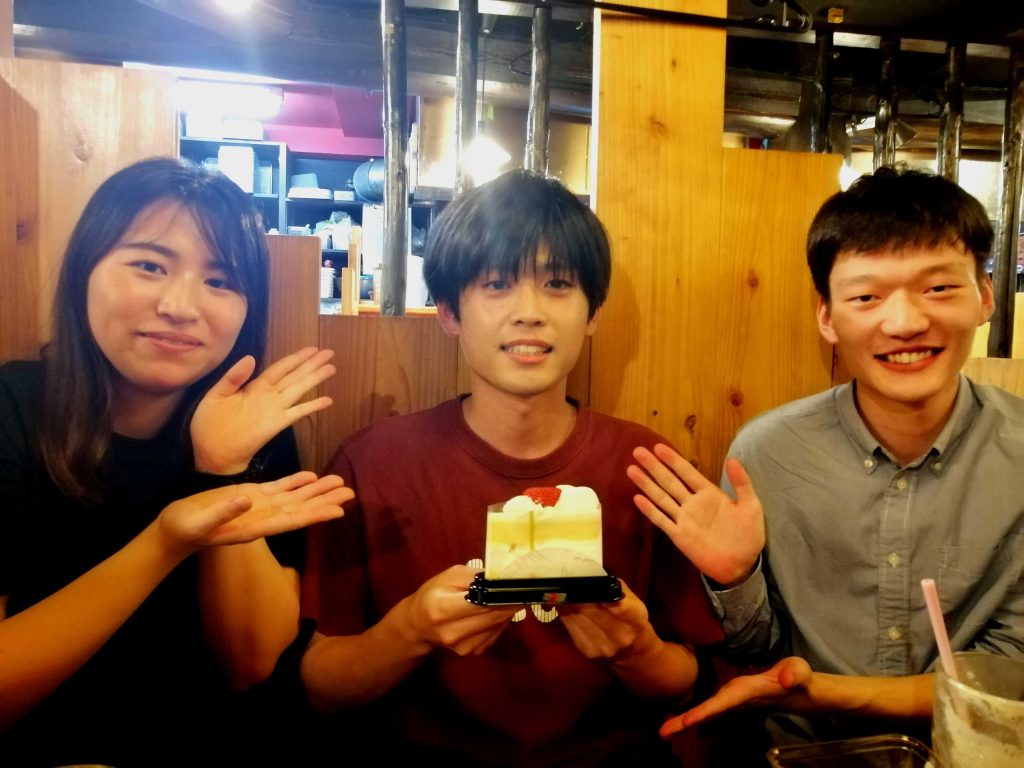 By the way, my birthday was celebrated with a shortcake after the lab seminar ~
By the way, my birthday was celebrated with a shortcake after the lab seminar ~
Our lab homepage has been updated!
We are pleased to announce that our homepage has been updated. However, the appearance of the homepage has not changed much. The major change is that the address has been changed and the domain name has been changed to the University of Tokyo. LIIS in the current address stands for Lab for Innovative Infrastructure Systems. Personally, I used “New Generation Infrastructure System Lab” when I wrote my affiliation in English presentations, but from now on I will actively use LIIS.
The site is now responsive so that it can be easily viewed on smartphones!
And we have changed our CMS to WordPress. It is faster and easier to manage than the old one, and we would like to update it more frequently.
It is introduced on the website of Corp.Nankuma, who commissioned us to create the site.
The English page is still under construction, but we plan to make progress little by little with the help of foreign students!
[Hasegawa]
Comittee of Infrastructure Planning and Managemant
[June 4 – 5, 2022]
M1 Hasegawa, OG Tabuchi, and OB Kimura presented their papers at the Comittee of Infrastructure Planning and Managemant held online on June 4 (Sat.) and 5 (Sun.). The titles of their presentations are as follows.
Time-of-day Charging Simulation of Urban Railways Based on Structural Changes in Demand
(Comet Kimura and Daisuke Fukuda)
Ex-post Evaluation of Recent Inter-regional Allocation Policies in Japan: A QSE Approach
(Keita Hasegawa and Daisuke Fukuda)
The Impact of Urban MaaS Introduction on Lifestyle Behavior and Evaluation of Subscription Plans: A Simulation Analysis in the Tokyo Metropolitan Area
(Keiko Tabuchi and Daisuke Fukuda)
Other presentations related to Dr. Fukuda’s work were as follows
Development of the Activity Simulator “Tokyo Metropolitan Area ACT” and its Application to the Study of Urban Transportation Policies
(Ryoji Ishii, Daisuke Fukuda, Hideki Yanaginuma, Takahiko Kusakabe, Wataru Mogi, Koshi Isono, Takeshi Shibukawa, Hirotsugu Suenari, Ryuta Nishi, Shota Ito)
Fusion Method of Activity Simulation and Observation Data in Tokyo Metropolitan Area
(Akane Komiyama, Kuniaki Sasaki, Daisuke Fukuda, Ryoji Ishii)
Individual Activity Estimation Using Activity Simulator and Cell Phone Base Station Data -Assessing the Applicability to the Corona Disaster
(Ryoji Ishii, Kuniaki Sasaki, Daisuke Fukuda, Yuhan Gao, Akane Komiyama)
Dr. Takayama of Kanazawa University, Dr. Okuda of Nanzan University, and Dr. Kono of Tohoku University gave us advices on the improvement of the model and the direction of future application of the model. All of their comments were very helpful for the submission of the paper. I would like to take this opportunity to thank them.
[Hasegawa]
| Conferences Lab Life by Students
